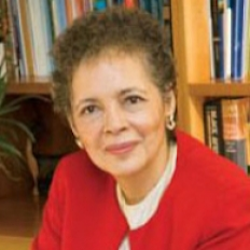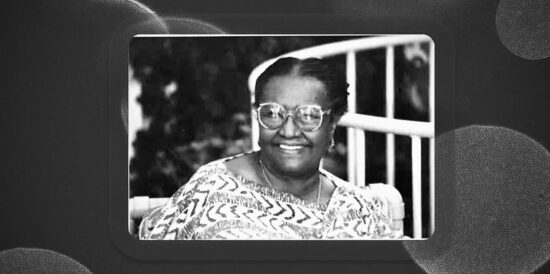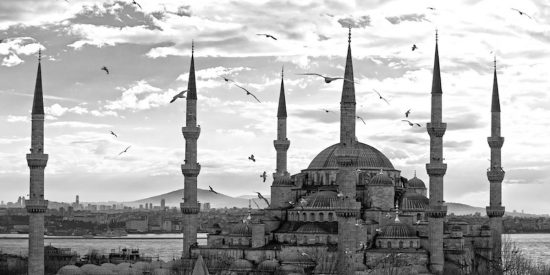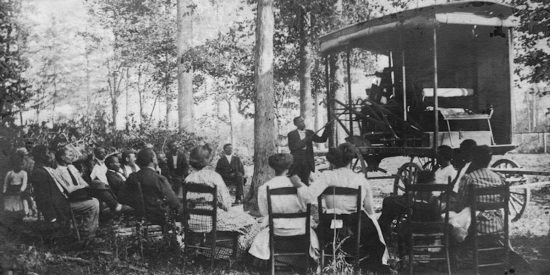The world of tomorrow will present thorny challenges as we navigate natural disasters, public health crises such as HIV/AIDS, the rising tide of globalization, the constant threat of terrorism and nuclear war, the uncertainty of peace in the Middle East, and the emergence of China as a world power. Technological changes will force us to consider the ethical implications of medical and scientific advances ranging from cloning to stem-cell research. To lead our constantly changing world, we will need strong, secure men and women with values and a sense of purpose—leaders who are highly disciplined and possess integrity, vision, and the courage of their convictions. World peace, economic progress, and social development will depend on the creativity, the sensitivity, and the compassion of these people.
Hurricane Katrina gave us a perfect example of the leader of tomorrow: Army Lt. General Russell Honore, the three-star general President Bush relied on to bring order to chaos and coordinate the military’s response to the havoc wrought by Katrina.
As New Orleans Mayor C. Ray Nagin put it, “I give the President some credit on this. He sent one John Wayne dud here. Honore came off the doggone chopper and started cussing, and people started moving. He’s getting some stuff done.”
One minute the general could be heard barking at soldiers, “Lower your weapons, goddamiat!” At another moment he was seen holding a baby and whispering, “Let’s go, Tiger!” as he gently delivered him into waiting arms. With so many other factors spiraling so quickly out of control, General Honore oversaw the speedy rescue of 60,000 people (ck) from the New Orleans Superdome and Convention Center (277).
I remember the press conference where the general publicly fretted about the next approaching hurricane, Rita, while reporters continued to obsess over Katrina. “Don’t get stuck on Katrina,” the general told them. A few minutes later he tartly added, “Don’t get stuck on stupid, reporter.” You might think the rebuke would have rubbed reporters the wrong way. On the contrary: During a CNN interview an anchor said to him on the air, “You’ re my hero.”
It was clear the press respected a man with backbone, who pulled no punches, a man who was confident in his experience, a man who bore the mantle of responsibility with ease. Honore had been shaped by the military but was imbued with street smarts. Clearly General Honore was his own man, and that inspired trust, respect, and confidence in others. He could be tough, but he showed sensitivity and compassion when the situation called for it. Honore’s ability to respond instinctively but equitably to events on the ground made people willing to follow his lead.
Why did so many people recognize and welcome the general’s gift of leadership? Especially in times of crisis, people want to know that the man or woman in charge is decisive: a straight-shooter, someone who knows what it takes to get the job done, someone who is not afraid to own up to mistakes made. When a city was struggling to survive—when a nation was fighting to reclaim its bearings—General Honore charted a steady, dependable course to recovery. Our future challenges will demand no less. (540).
The future, of course, will not be defined exclusively by disaster. We are moving in many ways toward a world without boundaries—a world where the talk is increasingly about “people of color,” who constitute the majority of the world’s population and who must be reflected in its marketplace.
Witness the emergence of India and China and their rising economic power; consider the fact that, in the not too distant future, Hispanics will be the dominant population in America; reflect on the reality that each day America becomes home to a growing number of Muslims and other immigrants from countless other faiths around the world. As a nation whose strength is a function of its diversity, we will require tolerant leaders—leaders who view the world through a wide angle.
That definition fits my first boss, John Johnson, founder and publisher of Ebony and Jet magazines. When Johnson realized how inadequately the United States was presenting its diverse face to itself and the world, he set out to make a difference. Upon his death last year, the U.S. media focused on his visionary realization, back in the Jim Crow America of the l940s, of the importance and economic power of expressing America’s cultural, ethnic, and racial diversity. Before Ebony came along, rarely were African-Americans seen in the pages of magazines as lawyers, doctors, or judges—-men and women of achievement—even though they populated all those professions. As a leader, Johnson used his magazines to simultaneously instill racial pride and present a diversified, more accurate picture of America. All this at a time when doing so was neither easy nor profitable.
Advertisers took a long time to buy into Johnson’s vision. “I couldn’t sell ads,” he told one interviewer. “ I was ready to go out of business.” But Johnson persevered. Eventually he landed Zenith as his first advertiser; ever so slowly, others followed (867).
It was clear that Johnson saw America in the grip of a grave inequality. Emboldened by his grasp of the big picture, he dared to confront the power structure, pushing advertisers to acknowledge the economic viability of the black market. Johnson displayed determination, stick-to-it-iveness, creativity, and a positive attitude. He understood that a knock can be a boost—that it’s not where you came from that matters, but where you are going.
Changing demographics mandate that leaders of the future foster diversity and inclusion in the workplace, especially at the highest levels of corporate America. If they are to expand their market share, increase shareholder value, and mirror the global marketplace, Fortune 500 companies will have to place more women and minorities on their boards, in senior management positions, and as chief executives.
Yet the higher you go in corporate America, the less diversity do you see. It will take real leadership to change this image, but it is imperative that we do so, especially in a world where diversity is a commonplace of national and international business dealings. Commitment will be required to stay this course. Willingness will be required to take a stand when your competitors don’t, knowing that you may have to risk loss in the present to emerge as a winner in the future. Leaders must be open to new ideas, even when—perhaps especially when—such notions are out of currency. They must stand in front of the curve rather than behind it, and they must understand that what they do is more important than what they say.
Last year Paula Kerger, in her role as Executive Vice President and COO of Thirteen/WNET and WLIW 2l, made the difficult decision to air a children’s program on the public broadcast station that included the portrayal of a lesbian family. Negative responses, including from government and Public Broadcasting Service (PBS) officials, came fast and furious.
Kerger, who this year was selected to head PBS, was convinced that the show reflected American life today—and that it should be seen. “We never wavered, even when times got tough,” she told me. “One of the most difficult things was to keep everyone positive and focused on the fact that we must prevail.” The role of cheerleader and coach cannot be underestimated, particularly when the staff feels under fire.” As we deal with other controversial social realities in the future, Kerger’s brand of staunch leadership will be more and more in demand. Like Army Lt. Honore, she refused to buckle under as the pressure bubbled up. Kerger acted out of her determination to reflect America as it is. It’s easy to be a leader when everyone agrees with you. It’s harder when you’re alone. Kerger’s work also brings her in touch with many young people who have grown up on the Internet. “The next generation of leaders need to be encouraged to work with colleagues face to face and not hide behind e-mails, “ she says. “Leadership and social engagement work hand in hand.”
In the political arena, my ideal leader of the future may well be one from the past: Moon Landrieu, who served as Mayor of New Orleans from l970 to l978. Landrieu’s political legacy includes a daughter, Senator Mary Landrieu (D-La.) and a son, Lieutenant Governor Mitch Landrieu of Louisiana, now running for Mayor of New Orleans. During field research I conducted for My Soul Looks Back in Wonder: Voices of the Civil Rights Experience (AARP Books/Sterling, 2004), Mayor Landrieu told me of his resolve to defy the segregationists when he entered politics in the l960s. Though Landrieu’s steadfast support of integration jeopardized his fledgling political career, he chose principles over politics. His personal priorities reflected his trademark independence of thought, vision, integrity, and independent thinking—qualities that any leader in any arena should be prepared to embrace. You wonder: are people born with these leadership qualities? Or do they learn them in the course of a life well lived? And if these attributes are indeed learned—and learnable—how best can we teach them?
Can lessons be drawn from the way Landrieu and other politicians have served our nation? One clear message can be discerned from their past actions: Future political leaders must abandon the petty divisiveness that dominates today’s politics. To be truly effective, a leader must focus on consensus, not conflict. He or she must be able to emerge from a tough fight with their respect for the opponent intact, recognizing what they can agree on and putting the common good before their self-interest.
In this Sarbanes-Oxley era of corporate governance, the nonprofit world will increasingly benefit from developing skills on which corporate andgovernment leaders have always relied. I see this resourcefulness in Barbara Hackman Franklin, who two years ago became the first female chairman of the Economic Club of New York. Secretary of Commerce from l992 to l993 and now head of her own consulting firm focusing on international trade, corporate governance, and auditing and financial-reporting practices, Franklin has brought her considerable skills and experience to bear on the operations of the nearly l00 year-old club, and the impact has been dramatic.
Franklin and her team created audit and finance committees and rejuvenated the executive committee. She expanded the membership committee, and charged it with targeting a new generation of leaders. She has worked closely with the Club’s new President to make communications, financial structure and programs more responsive to a 2lst tCentury membership.
Although Franklin clearly knows her own strengths as an individual, she is also quick to credit collaboration. It’s important for a leader to give credit to others,” she stresses. “It’s important to thank people repeatedly for what they are doing, especially in an organization where everyone is a volunteer.” Franklin recognized a need for greater efficiency, dared to make the changes that were necessary, and understood that every leader depends on backup to succeed.
Finally, moral leadership will be needed in the future just as much as it has been in the past. I have always found a compass in Pope John Paul II. You did not always have to agree with the Pope to admire a leader unafraid to tackle the hard issues. In so doing, Pope John Paul challenged people to think more deeply about those topics, and more carefully. During the Pope’s l995 visit to the United States, for example, he spoke often of those in need: “America has a reputation the world over, a reputation of power, prestige and wealth,” he told one audience. “But not everyone here is powerful; not everyone here is rich. In fact, America’s sometimes extravagant affluence often conceals much hardship and poverty.”
Ten years later, as the aftermath of Hurricane Katrina has ripped aside the curtain concealing America’s poor, events have unequivocally shown how right he was.
Poverty, of course, respects no national boundaries, and this was a leader who understood that nearly two billion of the world’s people live on less than $l a day. (ck) Yet with the Internet having collapsed the planet’s barriers of time and distance, the have-nots of the world can now see just how much the haves possess. Unless leaders of the future tackle this disparity head on, more global unrest and instability will ensue. When the Pope died, millions of people around the world mourned his passing, reminding us that here was a leader, indeed, for all times.
Like the other leaders described here, he spoke truth to power. He aspired not to be popular, but to be honest. He also had style, personal warmth, and a quick sense of humor. If he was stern, he was never caustic. And you always knew where he stood.
In ten years, the world has gotten more complicated: information travels raster than jets; pandemics such as avian flu, threaten our daily lives; we face the dangers of global warming and much more. In a world that will be increasingly diverse and technologically advanced, the hunger for access and economic equality will only grow sharper. Leaders who are honest, but not self-righteous, leaders who understand and respect world cultures, leaders committed to bridging the divide between rich and poor—these are the men and women who will make the difference in how well we manage the next ten years.
From the book:
VISIONS, STRATEGIES, AND PRACTICES FOR THE NEW ERA.
Editors: Frances Hesselbein and Marshall Goldsmith






